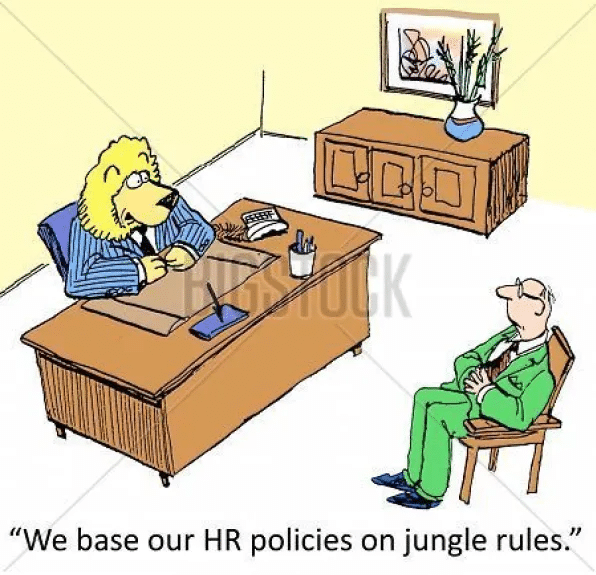If you were thinking an HR Generalist is probably some sort of rank in the HR army, then you’re wrong. Capital R wrong. Or wait, how do they spell wrong?
Anyways, whether my spelling of wrong is wrong or not, that doesn’t change the fact that whatever you thought HR Generalist means is also wrong. Except, of course, if you got it right.

Are you confused? Good. My mission is going fine. Moving on.
Who is an HR Generalist?
Short for Human Resource Generalist, this is a professional who oversees the human resources responsibilities and activities of an organization. They are responsible for making sure that employees follow all the company’s policies and procedures.
Think of them as the company’s police force, sort of. They also create new onboarding plans and educate newly hired employees about their rights and duties.

SEE: Imposter Syndrome: What It is, How to Cope With It
HR Generalists run the daily functions of the Human Resources (HR) department. This includes hiring and interviewing staff, administering pay, benefits, and leave, and enforcing company policies and practices.
Their duties also include comparing HR laws to current policies and procedures and drafting templates for HR documents.
Job description of HR Generalist
Typical duties include:
- Creating employee engagement plans, initiating activities, and getting necessary budget approval
- Generating official internal documents such as appointment letters, offer letters, salary slips, and warning letters
- Creating a recruitment plan and calendar according to operation and sales projections
- Maintaining physical and digital files for employees, including their documents, benefits, and attendance records
- Drafting onboarding plans and educating newly hired employees on HR policies, internal procedures, and regulations
- Evaluating employee performance and appraising their pay scale accordingly
- Addressing employee grievances
- Taking appropriate disciplinary action against employees who violate rules and regulations
- Collaborating with outside vendors, upper management, and employees to maintain CSR standards conscripted by authorities
RELATED: Employee Attrition: Meaning, Effects and How to Avoid It
Qualifications
Skill set
HR Generalists are, for lack of a better word, people managers, as they manage the company’s employees. And in order to effectively do this, they should have certain hard and soft skills, including:
- Excellent verbal and written communication skills
- Knowledge of administrative tasks and responsibilities
- Problem-solving skills and resourceful thinking
- Advanced computer skills, including data entry, data processing, communication tools, and human resources software
- Leadership and coaching skills
- Detail-oriented with excellent organizational skills
- Strong empathy and interpersonal skills
- Attention to detail and analytically driven
Educational and experience requirements
An HR Generalist should have experience conducting successful recruitment procedures and should know how to take care of all employee-relations-related duties. This is why most employers look for candidates with previous experience in other HR positions, like HR Assistant, to ensure they’re familiar with typical human resources procedures.
However, some may choose to hire applicants with other human-related experience as well, such as those who have worked in customer service.
In relation to education, requirements depend on the industry and company’s size, but candidates are usually required to have a Bachelor’s degree in human relations, business, or related fields. However, some employers prefer candidates with a Master’s degree in HRM (Human Resources Management).
Some may even go as far as seeking applicants with advanced certifications, like Professional (PHR), Senior Professional (SPHR), or even Global Professional (GPHR) in Human Resources.
SEE: Work-life Balance: What It Is, and How to Improve It
Salary
Yeah, I know this is the part you’ve been waiting for. Some of you didn’t even bother reading all the Arabic I wrote above, which means you definitely missed the part about giveaways for aspiring HR Generalists. Yeah, that’s right… scroll back up.
Anyways, all the packaging won’t mean anything if the job doesn’t pay well, which means you’re in for some good news.
It pays. Well.
An HR Generalist makes an average of $57,644 per annum in the United States. And while this salary may vary due to factors like the candidate’s education/experience, industry, and location, e plenty abi e no plenty?
But, of course, that’s America. What of in Nigeria, you ask?
Well, an HR Generalist in Nigeria makes an average of ₦175,000 per month. That’s ₦2,100,000 per year. Not plenty? Carry gun and go rob bank naa.

FAQs on HR Generalist job description
What’s the difference between HR Generalist and HR Coordinator?
HR coordinators typically administer health and benefits plans and serve as liaisons between employees and insurance providers. However, the duties of HR Generalists are broader, and may include supervisory roles.
To some companies, though, they’re the same job, and the titles are used interchangeably.
Is HR Specialist and Generalist the same?
An HR specialist focuses on the basics and processes of HR and thus performs that specialized task. However, an HR generalist is an all-rounder who works from recruitment to payrolling to employee benefits.
Who is higher, HR Manager or HR Generalist?
An HR generalist manages the day-to-day needs of an HR department, while an HR manager is a human resources professional who manages a staff of HR generalists.
What is the next level after HR generalist?
HR MANAGERS. HR generalist is an entry-level position in HR. From there, they are often promoted to HR managers, and then to HR DIRECTORS.
How long does it take to become an HR Generalist?
It takes a minimum of six years to become an HR generalist.
To become an HR generalist, a person a bachelor’s degree in Human Resources or a related field and about two years of work experience or a master’s degree.
SEE: Easiest Ways to Lose Your Job
Conclusion
So, now you have it. In case you wanted to become a banker but then realized that you suck at keeping your own money, not to talk of other people’s own, HR Generalist is a possible career path.
Provided you have the required skill set.
And don’t worry too much about the six years stuff; you can always begin as an office assistant and work on your degrees during that time. That way, you’ve eliminated the work experience time… what? You didn’t find anything about giveaways for HR Generalists.
Huh! That’s weird. I’m pretty sure it’s somewhere there. Read it again.
